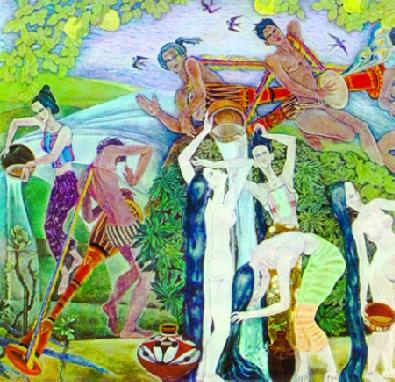
Photo: Oriental Morning Post 东方早报
The wall mural “Water-Splashing Festival – A Celebration of Life” (pictured above) was among the “vulgar” contents that the Beijing 21Vianet Data Center Inc., a service provider for management of internet data, had advised Wu Hong that he should take care to “delete within the next two hours” or face a shutdown of his website. Wu Hong is the editor-in-chief of the well-established website ArtIntern.net which showcases artworks from various artists of all professional levels and genres.
Wu told the company that almost all of the users on ArtIntern.net are professional artists, many of them are teachers or students at well-established art schools, so their works could credibly be considered professional art. Among the content the service provider deemed “vulgar” and demanded to be deleted were the works of well-recognized and world-renowned Chinese artists; many of the paintings had been previously exhibited in galleries or had been published in art books both in China and around the world. Yet, because the subject of the paintings was the human form, they were considered “vulgar” and “inappropriate” and thus needed to be removed immediately.
“We had wanted to discuss the basis for why the pictures were deemed 'vulgar' with the proper authorities, but the staff at the IDC company couldn't and wouldn't disclose which law enforcement offices had passed judgment and ordered the deletion,” said Wu. “So, we have our hands tied when it comes to seeking out the proper channels to appeal the decision. We're left with no choice but to comply and delete the images as required – as we'll face a shutdown of our website if we don't act accordingly.”
Many Chinese artists are confused and dumbfounded to be told that their works depicting the human form were “vulgar” and “had to be removed.” Where was the basis for such a judgment?
For years, past and present, artists have used the human form to depict and express many different themes. In 1965, even Chairman Mao recognized the necessity for having an open mind when it comes to such matters: “Nude models, be they young or old, man or woman, are the basis for artistic creations. People learn to draw and sculpt first with the human form. It is not right to try and judge it foul with the old way of thinking.”
In October, 1979, Yuan Yunsheng created the wall mural “Water Splashing Festival – A Celebration of Life”. The mural that had challenged the norms of society at the time, included three nude figures portraying women of the Dai ethnic minority bathing. The mural was allowed to be exhibited at the Beijing Airport after consent was secured from Deng Xiaoping, who was chairman at the time. Foreign media swarmed all the over the phenomenon: “Nude depictions of women were allowed to be shown on walls in public places. This signifies a real approach to openness and reform in the country.”
In the 1980s, authorities tried covering the nude women with veils of cloth and three-fold boards. It wasn't until the Asian Games in September of 1990 were the veils and boards finally done away with and the mural was allowed to stand as it is. With this new internet filter to eliminate nude paintings, does this mean that China is actually reverting back to the old ways before the modern reforms?
Source: ifeng.com
***
Related Links
China Internet filtering software:Green Dam-Youth Escort
China shuts down 50 more porn Web sites in sweep
The People's Republic vs. Porn
Warning:The use of any news and articles published on eChinacities.com without written permission from eChinacities.com constitutes copyright infringement, and legal action can be taken.
All comments are subject to moderation by eChinacities.com staff. Because we wish to encourage healthy and productive dialogue we ask that all comments remain polite, free of profanity or name calling, and relevant to the original post and subsequent discussion. Comments will not be deleted because of the viewpoints they express, only if the mode of expression itself is inappropriate.
Please login to add a comment. Click here to login immediately.